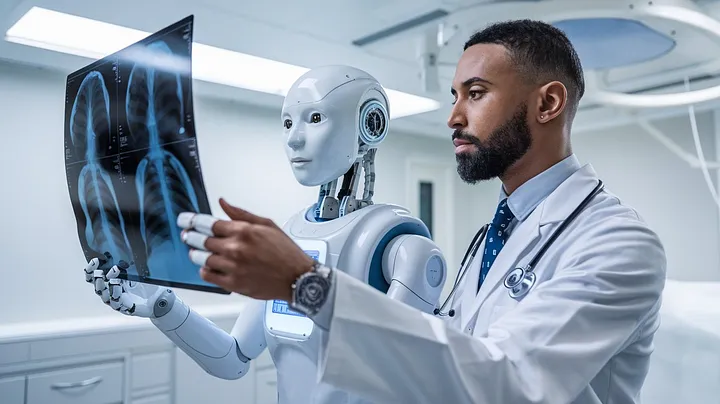Let’s be real: going to the doctor can still be a trip to the past. Paperwork, wait times, and unintelligible results aren’t exactly the marks of a high-tech experience.
That’s changing fast, however.
AI is shaking things up in ways that actually make healthcare smarter, quicker, and more personal. And as imperfect as it is, its impact is already hard to overlook.
Here’s how AI is revolutionizing healthcare today, and what it holds for you, me, and millions of people around the globe.
1. Faster and More Accurate Diagnoses
Suppose you show up at a clinic with a cough and fever. Usually, a doctor would need to question you, maybe order a chest X-ray, and send it to a radiologist. That would take hours, or days.
With AI, the diagnosis can be done in minutes.
AI-powered systems like Google’s DeepMind or IBM Watson can analyze medical images, like X-rays, MRIs, and CT scans, faster than most human radiologists. They spot tiny details humans might miss, flagging early signs of cancer, pneumonia, or even rare diseases.
Real-world example:
In 2020, an AI algorithm in South Korea detected breast cancer in mammograms more accurately than a team of radiologists, and faster.
So yeah, it’s not hype. It’s working.
2. Personalizing Treatment Like Never Before
No two patients are exactly alike, so why are treatments often one-size-fits-all?
AI is helping doctors personalize care by crunching huge amounts of data: your genetic profile, medical history, lifestyle, even how you responded to meds in the past. With that, it can suggest which treatments are most likely to work for you.
Think of it like this:
Instead of relying on guesswork, AI allows doctors to make decisions concerning you, not average outcomes.
For people who have long-term illnesses like diabetes, it can also mean fewer side effects, more effective treatment, and a better quality of life.
3. Revolutionizing Drug Discovery
Developing a new drug is painfully slow. It takes 10–15 years and billions of dollars. But AI is speeding it up.
By analyzing molecular structures, past research, and trial data, AI can predict which compounds will work and skip the dead ends. That enables scientists to test fewer candidates, fail earlier, and reach actual solutions sooner.
Example:
During the initial phases of COVID-19, AI algorithms were utilized to screen thousands of potential drugs within weeks, enabling scientists to prioritize their efforts and save valuable time.
This isn’t putting scientists out of a job with AI, but it’s definitely their new favorite lab buddy.
4. Virtual Health Assistants (That Actually Assist)
Ever held on the phone to obtain basic information from your clinic?
Now, many hospitals and providers use AI-powered chatbots or voice assistants to handle simple but time-consuming tasks, like scheduling appointments, answering FAQs, or sending pre-visit instructions.
These aren’t those annoying “press 1 to repeat” robots. Some are even trained on medical information and can respond to patient inquiries 24/7 with surprising accuracy.
And the best part:
They allow human staff to focus on what matters most: actual patient care.
5. Predicting Illness Before It Strikes
What if your doctor could warn you about a future health issue, before symptoms even show up?
AI is making that a reality.
By crunching data from wearable sensors (like your smartwatch), electronic health records, and even sleep, AI can predict risks of heart attacks, strokes, or diabetic complications years in advance.
This is huge for preventive care.
Example:
The Mayo Clinic uses AI algorithms to predict heart conditions by simply assessing EKG results. And in some trials, the AI beat out trained cardiologists at spotting early red flags.
But What About Privacy and Bias?
Let’s catch our breath for a second.
As exciting as all this is, AI in medicine is not immune to imperfections. Algorithms can learn the same prejudices as the data they’re trained on. If a system has been trained mostly on data from one group, it can perform badly on others.
Then there’s the issue of privacy. Medical data is personal, and not everyone is thrilled about algorithms trawling through their health record, even if it is anonymized.
That’s why it’s important that patients stay informed, regulators stay strict, and developers stay ethical. AI in healthcare needs to be fair, transparent, and secure if we’re going to trust it.
Final Thoughts: The Doctor’s Office Is Getting an Upgrade
AI isn’t here to replace doctors. It’s here to support them, help them work faster, make fewer errors, and give patients better care.
If you’re anyone who’s ever waited weeks for test results or bounced back and forth between treatments that didn’t work, this shift is good news.
Because at the end of the day, better tech means better health, and that’s something we can all get behind.
If You Want to Learn More
Curious about how AI in healthcare is growing beyond clinics and hospitals?
Check out our Tech section for more articles on the tools, trends, and breakthroughs changing our lives every day.
Read more from AI in Healthcare to explore research, case studies, and expert interviews on where this technology is headed.



